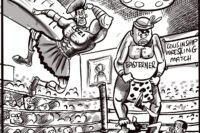Zambia has an opportunity to be the hub of corporate leadership in the region but to enjoy this status, a lot has to be done to fast track the knowledge acquisition process – particularly in corporate leadership. In the past 15 years, I have had significant exposure with corporate and business leaders from many countries. One thing stands clear: we need to speedily and strategically incubate a cadre of business thinkers and leaders if we have to move from the tail to the top.
A friend recently remarked to me that most Zambians have made a lot of money from business activities but that does not make them good business leaders. What this means is that while making money is easy, sustaining a business beyond your life-time requires good business leadership. I benchmarked this statement with what I experienced in 2007 when I recruited five business managers from Zimbabwe. Our friends have been thoroughly groomed in business leadership. Their business acumen is properly grounded in skill, knowledge and strategic thinking. It is on the back of strong leadership skills at corporate level Zimbabwe remained standing even after collapsing! Today, despite the numerous problems with its economy, Zimbabwe collects more in taxes than Zambia does.
I also had another experience with Kenyan executives at the time I worked for Zambian Breweries, which bottled the Coca-Cola brand. Sitting on those strategy formulation meetings for Coca-Cola made me ask one fundamental, albeit debatable, question: ‘Why are Zambians not fully anchored in the top leadership of these organisations?’
The real transformation in my approach to leadership happened at the time I was sent for a four-month leadership training at the GIBS Institute, a branch of the University of Pretoria. Shortly afterwards, I went to Cambridge University for a weeklong course in strategic leadership training. These multinationals groom business leaders. They spend millions and millions mentoring young managers to be leaders. It was then I developed a deeper level of passion to reposition Zambia’s young managers so that we also assume those regional and global corporate leadership responsibilities. Even when I joined the IMF in 2014, part of me desired to come back and fulfil the dream. One year doing training in Zambia has been the most fulfilling moment of my life; I am simply enjoying sharing knowledge and have already done so with dozens of companies. I enjoy it for the following reasons:
MINDSET MODELLING: The reason Kenyans, Zimbabweans and a few others are an edge ahead of us is because we were modelled differently. The post-independence generation, of which I am part, has been shaped by the politicians and not entrepreneurs. The control of enterprises by the state somewhat inculcated an ‘I don’t care’ attitude in us. Executives and managers in parastatals got rewarded even when they made losses. To date, there is hardly any parastatal that makes genuine profits. We declare as profit even what has not and will never be received as income.
It is in parastatals you find decisions are inclined towards loss making. The cost-benefit analysis only comes as an after-thought. You do not get fired if you spend above budget ten years in a row. Your contract is determined by goodwill and not so much about your ability to make decisions of value. The sad part is that many young people who work in parastatals most of their lives hardly excel in the corporate world of the private sector. Many feel extremely lonely and seek to return to the parastatals because the thinking in the private sector is somewhat different; you have to be both efficient and effective for you to be considered a high performer. It is this gap that is motivating me to share knowledge because I have tasted both worlds and know what is expected in each. It is an issue of modelling a mindset to be competent and result oriented.
NATIONAL TRANSITION: It has been proved by scholars that for a country to grow, it needs capital and right skills. I can add that right skills attract the right capital. It does not matter how much capital a country has; growth will be very slow if the skills are not right. If there is anything that Zambia needs most at this time, it is about having well groomed, coached and mentored managers able to think strategically and in the process, innovate ways of attracting capital. I am hungry about quickly transitioning the mindset of young corporate leaders into highly effective strategic thinkers so that Zambia is ahead of Zimbabwe, Kenya, Senegal, Nigeria and even South Africa by 2040. We have to nurture and groom these young people to start thinking like 21st Century corporate leaders. They must be helped in ways of managing people under their guard for best results.
I believe Zambia has the human resource that will make it a very competitive country; the only thing the young managers need for now and in future is training; training and training!












